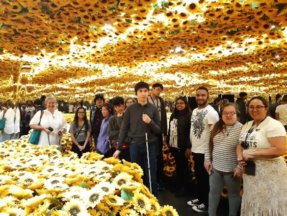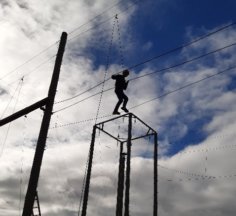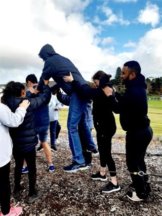

The Residential Transition Programme provides an opportunity for young adults who are blind, deafblind and low vision to live in a supported living situation as they make the transition to tertiary education, the work place or into the community. BLENNZ staff – including Resource Teachers Vision, Residential Youth Workers and support staff work closely with the students to support the development of individual goals and achievement.
Enrolment Considerations
Enrolment applications are considered on an individual basis by the BLENNZ Admissions and Withdrawals Committee. The following considerations guide the decision:
- Ākonga are enrolled on the BLENNZ roll or meet the requirements to be enrolled on the BLENNZ roll.
- Ākonga have made the decision to apply and agree to comply with BLENNZ and the Residential Transition Programme expectations of behaviour.
- Be able to participate as a member of a team and get on with others.
- Medical conditions must be stabilized with appropriate medications prescribed and managed.
Enrolment Process
Initial contact should be made with the Coordinator of National Residential Services. Ākonga attend a Transition Taster weekend the year prior to enrolment to enable them to make a fully informed decision. This is funded for the ākonga and one parent/guardian. If the Transition Taster weekend is missed then individual transition visits can be organised up to the end of Term Three each year for the ākonga and one parent/guardian.
There will be discussion alongside the Senior Manager Assessment and Teacher, the Coordinator National Residential Programmes, Residential Transition Senior Team and staff, whānau, the Visual Resource Centre, school and others as appropriate.
The final decision for acceptance is made by the BLENNZ Admissions and Withdrawals Committee.
What does the Residential Transition Programme provide for learners?
- Develop the skills for living in a supported flatting situation and for an independent flatting environment and the chance to make new friends.
- Orientation and mobility – cane skills, mapping skills, night travel, public transport including bus and train.
- Daily living skills – cooking, shopping, household tasks, budgeting, community awareness, personal safety education – self-defence and first aid.
- Career – options and advice, part time courses, part time work experience, preparation for work and further study.
- Technology – computing skills.
- Personal development – confidence and self-esteem.
- Self-advocacy, community support.
- Recreation and leisure activities – team building, camps and travel opportunities.
- Health education and much more.
- Based on the Homai Campus and staffed 24/7.

What does it cost?
Living costs are paid for by the Ministry of Education. Travel to and from Homai Campus at the beginning and end of each term is arranged and paid for by BLENNZ. Before coming to the Residential Transition Programme, ākonga are advised to visit their WINZ office and discuss their eligibility for a benefit. Most ākonga receive the Supported Living Payment. Personal costs are the responsibility of the ākonga.
Who may refer to the service?
Anyone may refer to the programme. All applications are to be completed alongside the family and are sent to the Senior Manager Assessment and Teaching.
Other Considerations
- Homai Campus needs to be the best educational placement for ākonga
- A suitable placement is available.
- Ākonga need to be independent with self-care
- Ākonga behaviour needs to be such that it does not compromise their own or others safety
- Medical conditions need to be stable
- Ākonga need to be able to participate as a member of a team and get on with others.
- Ākonga are involved in and understand the decision to live away from home to support their education.

